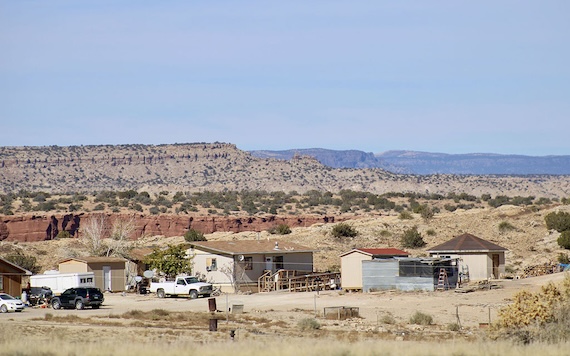( Cronkite News ) – The arid West is getting drier, and shrinking water supplies pose a boatload of risks to human health throughout the region.
Those findings come from a new federal report on climate change that also covers a broad range of hazards brought on by changing climate patterns due to human activity, from flooding to wildfires, drought to rising sea levels.
The Fifth National Climate Assessment identified drying in the Colorado River basin as one of the greatest climate risks facing the Southwest, as well as the region’s biggest area for future climate mitigation and adaptation.
The problem hinges on one key fact: The Southwest is getting drier, and it’s likely not a temporary phenomenon. Climate change is shrinking the amount of water on the surface and underground, replacing the normal ebb and flow of occasional drought with a permanent resetting of the baseline for how much water the region should expect to see each year, a process scientists call “aridification.”
Higher temperatures mean a shorter snow season and less water piling up as snow. Two-thirds of the Colorado River starts as snow in the state of Colorado. At the same time, the snow that does fall is being absorbed by thirsty soil and failing to make it all the way to rivers.
Heidi Steltzer, a professor of environment and sustainability at Fort Lewis College in Durango, Colorado, said that means people living in a dry region will have to shift their behaviors and develop practices that use less water.
“If we don’t have a lot of snow in any given winter, or over a five or 10 year stretch, where and how can we shift to some of these behaviors that ensure everybody has enough, even if it’s not as much as we used to have?” Steltzer asked.
Steltzer didn’t work on the Fifth National Climate Assessment but helped author a major United Nations climate report in 2019. She said rural communities, which often steward much of the nation’s land and natural resources through agriculture, should be a bigger part of conversations about combating climate change.
The new federal climate report doesn’t include many new scientific findings, but rather summarizes a lot of existing research and puts it in a context that is accessible to the general public. It also highlights the human health risks brought on by climate change. Across the country, those risks include heat-related deaths, breathing problems induced by poor air quality and wildfire smoke, and mental trauma brought on by natural disasters.

The report said already-marginalized groups – such as people of color, people with disabilities, and people experiencing homelessness- are disproportionately vulnerable to those climate-related health hazards.
The assessment’s authors say the latest report has an increased focus on climate justice compared to previous reports. In the Southwest, the report highlights drought-related health risks for Native American communities.
Heather Tanana, a law professor at the University of California, Irvine, who focuses on tribal water infrastructure and Indigenous health policy, helped author the report.
“In the Southwest, a lot of Native American homes don’t have infrastructure to get clean running water or sanitation,” she said. “The climate impacts of drought or flooding in an area where infrastructure is not sufficient is just going to make those inequities worse.”
Tanana said fixing those problems starts with better data about the impacts of climate change. Climate data about tribal communities, in particular, has historically been limited.
“When we have better data, we’re able to be more adaptive to implement climate solutions,” she said.
Water policymakers across the Southwest are currently working on new ways to reduce demand as a response to shrinking water supplies brought on by climate change. State leaders are under pressure to agree on new water management rules by 2026, when the current set of guidelines for managing the Colorado River expires. They are also facing steady calls to give tribal groups a larger voice in those negotiations.
-This story is part of ongoing coverage of the Colorado River, produced by KUNC and supported by the Walton Family Foundation.
Via Cronkite News


 © 2026 All Rights Reserved
© 2026 All Rights Reserved